It’s a Monday afternoon at Columbia University, but hundreds of students are not in class. They’re camped out on a lawn in front of the main library, making friendship bracelets, painting scraps of cardboard, and gossiping about the Zionists on campus.
“What should I do?” a girl with a mullet pops out of a tent to ask her friend. She’s holding a Sharpie in her hand, staring at a blank poster board. “I’m thinking ‘Dykes for Divestment.’ ”
A few steps away, in front of a sign that says “Paint Ur Nails 4 Palestine,” a girl is fanning her freshly polished red toenails. Nearby, a student with Farrah Fawcett’s hairstyle—except purple—is frantically asking other students if they’ve seen her vape. When she finds it buried under a copy of Frantz Fanon’s Black Skin, White Masks and a hoodie, she gasps and clutches it to her heart. No one is paying much attention to a nearby woman with a microphone, desperately trying to rally the crowd.
“Continue to support each other. This is all we have,” she declares. “Onward to liberation.”
There is a brief pause, and then about a dozen students start clapping.
Welcome to the “Gaza Solidarity Encampment,” a sprawling tent city with a first aid center, a counseling tent, a “People’s Library for Liberated Learning,” a writing center, an art corner, a media corner, and a “laundry area” for drying clothes after a rainfall. A student named Ariella, whose entire face is wrapped in a red keffiyeh except for two bright green eyes, tells me “there is a space” for everyone at the camp.
“They say that everybody has a role in the revolution,” they told me (Ariella goes by they/them pronouns). “And so there’s a space for people who like to organize stuff—and that’s me.”

Ariella says that they spend most of their time in “the tarp,” which is a section of the encampment with all the supplies—the melatonin gummies, the gluten-free bread, the organic tampons, the Aveeno sunscreen, the charging banks, the board games, and the pins that say “Union Proud.” The workers who enter the tarp, which Ariella tells me is also called “the cornucopia,” have to take off their shoes first, since it’s also their makeshift kitchen and they “want to keep it clean,” in the words of one tarp volunteer.
“Today I’ve been mostly tidying our Passover inventory,” says Ariella, 22. “I grew up very religious, and so I know the most minute details of what a religious person would need.”
Ariella, who was raised by modern Orthodox parents, tells me they went to a Jewish day school, where students sang the Israeli national anthem every morning. They began having doubts about the way they were raised at age 12, when they say they realized they were queer.
“It made me question things that I had been told were true,” they said. “If my community didn’t know how to embrace me as a queer person, what were the other things that they were not embracing?”







